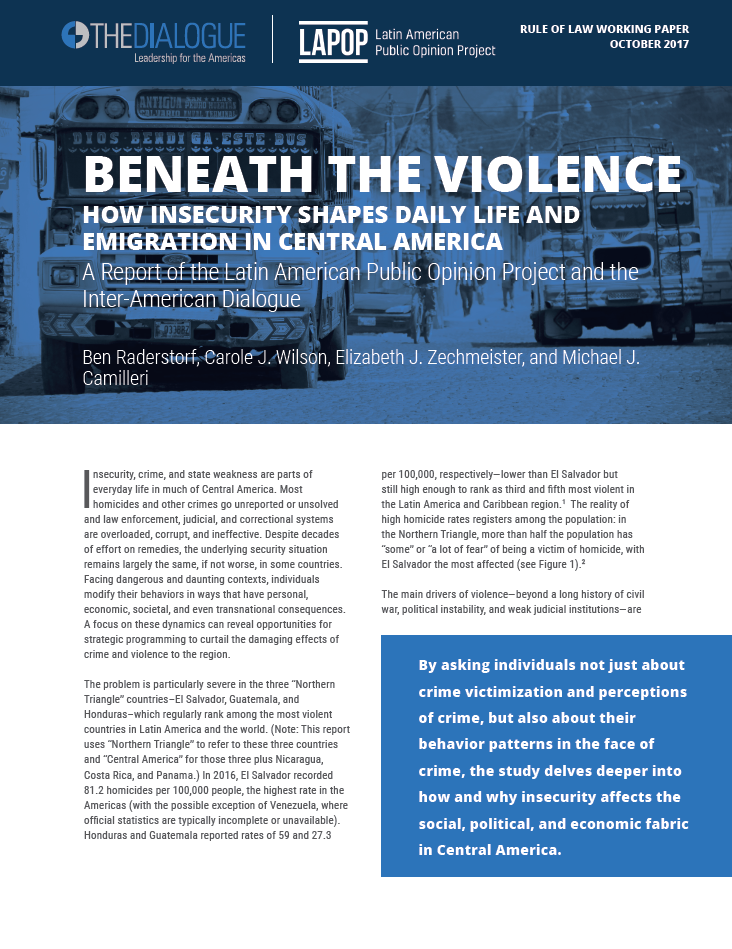Beneath the Violence: How Insecurity Shapes Daily Life and Emigration in Central America

This report from the Peter D. Bell Rule of Law Program and the Latin American Public Opinion Project at Vanderbilt University sheds light on how insecurity impacts everyday life in Central America and how violence shapes behaviors from economic activity to migration. Based on approximately 9,300 in-person interviews conducted across nationally representative samples in Guatemala, Honduras, El Salvador, Nicaragua, Costa Rica, and Panama as a part of the 2016/17 AmericasBarometer, these findings paint a detailed portrait of the ongoing toll that crime takes on countries in Central America, and offer guidance on how to move forward.
Download the full report here.
Notable findings:
- Approximately two-thirds of Central Americans (63.9%) report having prevented their children from playing in the street for fear of crime.
- In Guatemala, Honduras, and El Salvador, just over half of the adult population (50.5%) reports having avoided buying “things they like” in the past year because they may be stolen.
- 11% of adults residing in the Northern Triangle have changed their job or place of study in the past year because of fear of crime.
- 25.7% of Northern Triangle residents between 36 and 45

years old report feeling a need to move neighborhoods because of insecurity. - Public transportation is particularly vulnerable in the Northern Triangle, with 50% of Hondurans, 47% of Guatemalans, and 42% of Salvadorans avoiding it for fear of crime.
- 31% of Guatemalan parents report having kept children home from school because of crime.
- Experience of police corruption is closely correlated with crime avoidance behavior.
- Crime avoidance behavior is closely correlated with intentions to migrate, which have risen sharply in all Central American countries in the past five years, especially in Honduras.
- Interestingly, there is strong evidence that crime avoidance behavior (along with being a victim of a crime) correlates with increased engagement and activity in the community instead of self-isolation.
Policy recommendations:
- Focus on “push factors” instead of “pull factors” behind migration. These findings provide clear evidence for the argument that migration from the Northern Triangle is driven to a large degree by concern about crime and fear of violence. Policymakers in the United States looking to stem migration pressure should continue to focus on improving security and economic conditions in the Northern Triangle countries, rather than focusing exclusively on domestic immigration and border security policies.
- Think of security as an economic investment. The high incidence of crime avoidance behavior—particularly in employment and purchasing decisions—suggests a clear link between insecurity and missed economic opportunities. Measures aimed at improving citizen security situations should be framed as long-term economic investments.
- Invest in communities. Evidence suggests that community organizations and local institutions can be an important resource for those most vulnerable to crime and violence. Investing in communities at the micro level may be a critical juncture, both when it comes to lessening the burden of insecurity and as a potential way to stem pressure to migrate.
- Protect access to transportation and education. The sheer number of Central Americans that avoid public transit or keep their children out of school because of fear of crime translates to a significant loss of opportunity with significant long-term impacts on economic productivity and other outcomes. Improving secure access to both these services is critical when it comes to lessening the burden of crime and violence.
- Fight petty corruption and improve police to bolster community security. While the exact mechanisms still need to be studied, the link between petty corruption by police and crime avoidance behavior is clear. Improving the quality and efficacy of local police will help ease the impacts of crime. Fighting corruption more broadly may also help improve overall trust in institutions and improve the quality of public services, which can also help lessen the burden of insecurity.
- Stay focused on Honduras. Within Central America, the highest burden of crime avoidance falls on individuals in this country. Despite the recent progress in reducing homicide rates, Honduras remains the most affected in terms of crime avoidance behavior and it has the highest (and most sharply increasing) rates of intention to migrate.



















